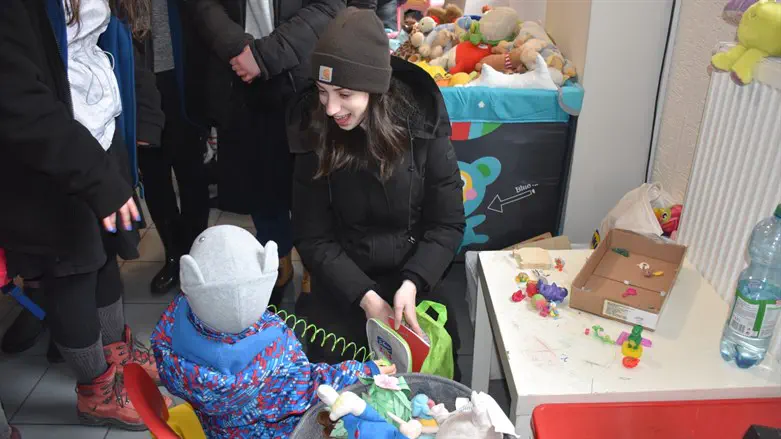
As the Nazis began rounding up the Jews to be sent to ghettos and eventually concentration and death camps, many tried to hide their religious identities in order to survive. To be a Jew meant to be treated as subhuman, and to be subjugated to harsh and unjust terror.
While at Yeshivat Chachmei Lublin — which for the time being has been turned into a shelter for refugees — we encountered a woman sent from Israel to volunteer. She explained to us that for the refugees, the opposite is true. With multitudes of Jewish agencies offering food, aid, and shelter, being Jewish opens so many doors for these refugees. Being Jewish now means that someone will be there to take care of and look after them.
For three days, a group of refugees — two women and four children — waited at the station in Ukraine before a train finally arrived that would take them to safety.
We met these refugees at a shul (synagogue) in Zamosc Thursday morning, where we were waiting with balloons and backpacks of toys for the children.
I approached a small boy in his mother’s arms with a backpack for him. He looked at me nervously as I opened the bag to show him all the fun things inside. He then turned back to his mother, hiding his head in her chest.
The distance between us was diminished by a connection shared through the universal language of candy. As I pulled a sweet out of the backpack, an immediate smile appeared on his face replacing the look of apprehension and tiredness. He grabbed it quickly from my hand and stuffed it gleefully into his coat pocket. I pulled more sweets from the bag and watched him grow more and more comfortable, slowly realizing that the entire bag was now his — something to call his own after being forced to leave everything behind.
As I waved goodbye to the little boy, his mother gave me a big hug. Despite our inability to communicate through words, I could deeply feel her gratitude.
As we traveled around Poland, we made stops in every refugee center we could to give out more backpacks to the children. In Krakow, a Ukrainian teenager volunteering at a center offering food, supplies, and lodging told us that, “It gives us a lot of strength seeing that there are other people who want to help too.”
The images of little boys and girls running happily to show their new bags to their parents are images we won’t soon forget, but the happiness emanating from the mothers’ faces carry the most weight. They delight in the sight of their children being enabled to hold on to their childhood innocence and radiance.
At the memorial for the 1.5 million Jewish children killed in the Holocaust, we read the words of Donia Rosen from her diary, in which she wrote at age 12, while hiding alone in the forest after her family’s murder.
“I am at a loss for words, but I must write, I must ask you not to forget the dead. I want to beg you, I implore you to avenge us. I want you to wrest a monument — a tombstone that will reach the skies, a testament for the entire world — a statue not of marble but of good deeds, because I fully believe that only such a monument can promise you and your children a better future.”
As we remember her and those who perished with her, we seek to live in her memory and act according to her will. Through kindness and good deeds, we seek to make the world a better place.
Devorah Wertheimer from Boston is on her gap year abroad at Ohr Torah Stone’s Midreshet Lindenbaum Seminary for Women in Israel. The program recently returned from a heritage trip to Poland, which included added stops to distribute toys to current Ukrainian refugees.
